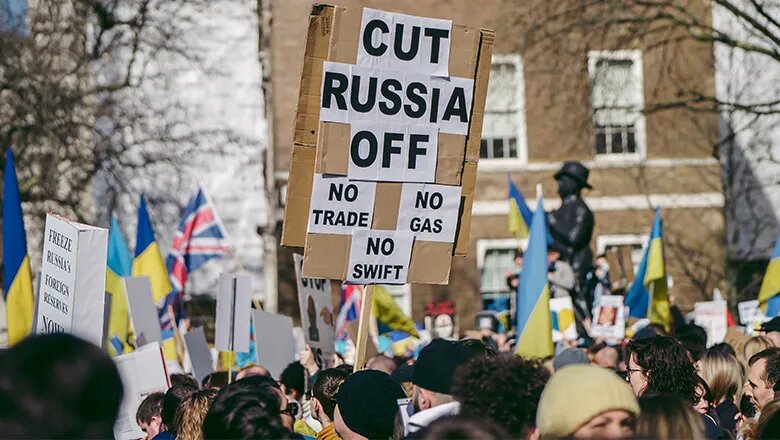The European Union has adopted its 16th package of sanctions against Russia, marking three years since the start of Russia’s full-scale invasion of Ukraine.
The EU aims to weaken Russia’s economic base, deprive it of critical technologies, and limit its ability to wage war. Finland’s foreign minister, Elina Valtonen, pointed to signs of economic strain in Moscow due to sanctions, emphasizing the need to maintain and strengthen sanctions against Russia.
The new measures target multiple sectors of the Russian economy and include individual sanctions against 48 persons and 35 entities who undermine Ukraine’s sovereignity, according to a statement from the EU Council.
“There is no doubt about who the aggressor is, who should pay and be held accountable for this war. Every sanction package deprives the Kremlin of funds to wage war. With talks underway to end Russia’s aggression, we must put Ukraine in the strongest possible position. Sanctions provide leverage,” said Kaja Kallas, High Representative for Foreign Affairs and Security Policy.
The package introduces several key measures:
- The EU expanded its maritime restrictions, targeting 74 additional vessels in Putin’s shadow fleet, bringing the total to 153 designated vessels. These ships are involved in circumventing oil price caps or transporting military equipment and Ukrainian grain.
- The Council is imposing transaction bans on financial institutions outside Russia that use the Russian Central Bank’s SPFS messaging system, developed to counter international sanctions. Additionally, 13 regional banks face new restrictions on specialized financial messaging services.
- The sanctions target 53 new entities supporting Russia’s military-industrial complex through dual use goods and technologies, with two-thirds located in third countries including China, India, Kazakhstan, the United Arab Emirates, Uzbekistan, and Türkiye. These entities have been involved in circumventing trade restrictions or procuring sensitive items, such as UAVs and missiles, for Russian military operations. The new restrictions include chemical components for riot control, CNC machine software, and UAV control systems. The measures also limit exports of industrial materials like chemicals, plastics and rubber to Russia, while restricting imports of Russian aluminum to reduce the country’s revenue streams.
The package also includes:
- A broadcasting ban on eight Russian media outlets (EADaily / Eurasia Daily, Fondsk, Lenta, NewsFront, RuBaltic, SouthFront, Strategic Culture Foundation, and Krasnaya Zvezda / Tvzvezda)
- Restrictions on ports and locks used for transferring military technology (UAVs, missiles and related technology) or circumventing the Oil Price Cap
- Enhanced prohibitions on road transport for EU operators owned for 25% or more by a Russian natural or legal person
- New constraints on oil and gas exploration technology exports
- Expanded restrictions on construction services to prevent the re-export of sensitive goods to Russia through third countries
The EU has also extended sanctions to Belarus that mirror those imposed on Russia, including restrictions on software, crypto assets, and transport, while adding new criteria to target those supporting Belarus’s military-industrial complex.
For Russian-occupied territories in Ukraine, including Crimea and regions in the east and south, the EU has implemented comprehensive restrictions on professional and technical services, ranging from accounting to IT consulting, to prevent their integration into Russia and extend these measures until February 2026. The restrictions also cover enterprise software and industrial design capabilities, along with related intellectual property.
These measures align with the EU’s commitment to supporting Ukraine’s independence and sovereignty while pursuing a peace based on UN Charter principles and Ukraine’s Peace Formula.
The 15th EU sanctions package against Russia, adopted on 16 December 2024 also focused on Russia’s Shadow Fleet and banned 52 ships used in transporting Russian crude oil and oil products.
Related:
- UK to announce ”largest” sanctions package against Russia on 24 February
- Bloomberg: Rubio told Europeans that sanctions will remain in place for now
- Putin only seeks ceasefire to regroup forces, dodge sanctions – Zelenskyy
- Zelenskyy claims ready to negotiate directly with Putin if “it’s only way to achieve peace”
- Why is Ukraine losing ground? Mobilization crisis and command failures exposed
- Russia demanded to cut Ukrainian army to 50,000 and install pro-Moscow leader in 2022 peace talks, Zelenskyy says




